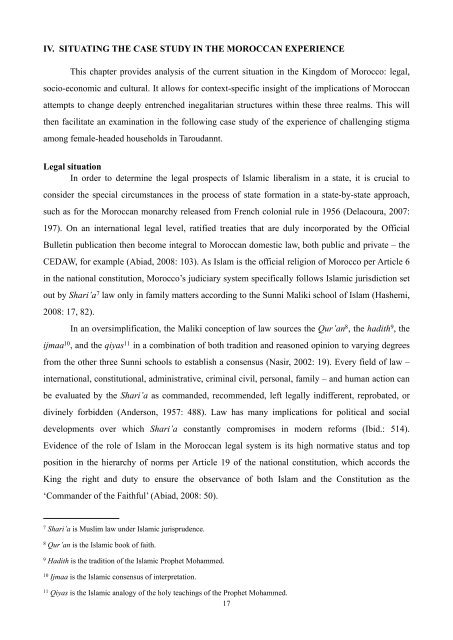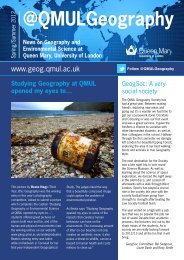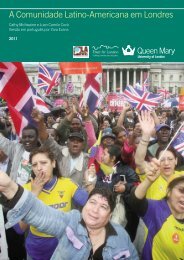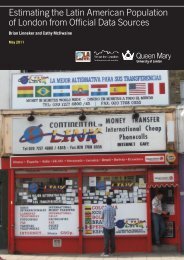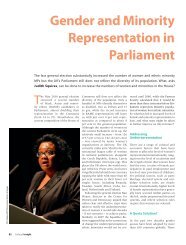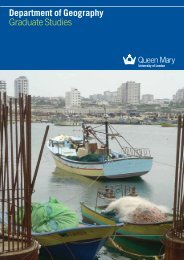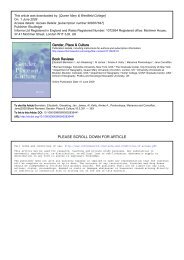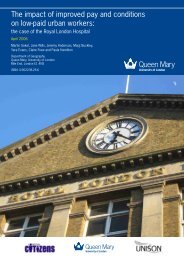Women's Empowerment and the Feminization of Poverty among
Women's Empowerment and the Feminization of Poverty among
Women's Empowerment and the Feminization of Poverty among
- No tags were found...
Create successful ePaper yourself
Turn your PDF publications into a flip-book with our unique Google optimized e-Paper software.
IV. SITUATING THE CASE STUDY IN THE MOROCCAN EXPERIENCEThis chapter provides analysis <strong>of</strong> <strong>the</strong> current situation in <strong>the</strong> Kingdom <strong>of</strong> Morocco: legal,socio-economic <strong>and</strong> cultural. It allows for context-specific insight <strong>of</strong> <strong>the</strong> implications <strong>of</strong> Moroccanattempts to change deeply entrenched inegalitarian structures within <strong>the</strong>se three realms. This will<strong>the</strong>n facilitate an examination in <strong>the</strong> following case study <strong>of</strong> <strong>the</strong> experience <strong>of</strong> challenging stigma<strong>among</strong> female-headed households in Taroudannt.Legal situationIn order to determine <strong>the</strong> legal prospects <strong>of</strong> Islamic liberalism in a state, it is crucial toconsider <strong>the</strong> special circumstances in <strong>the</strong> process <strong>of</strong> state formation in a state-by-state approach,such as for <strong>the</strong> Moroccan monarchy released from French colonial rule in 1956 (Delacoura, 2007:197). On an international legal level, ratified treaties that are duly incorporated by <strong>the</strong> OfficialBulletin publication <strong>the</strong>n become integral to Moroccan domestic law, both public <strong>and</strong> private – <strong>the</strong>CEDAW, for example (Abiad, 2008: 103). As Islam is <strong>the</strong> <strong>of</strong>ficial religion <strong>of</strong> Morocco per Article 6in <strong>the</strong> national constitution, Morocco’s judiciary system specifically follows Islamic jurisdiction setout by Shari’a 7 law only in family matters according to <strong>the</strong> Sunni Maliki school <strong>of</strong> Islam (Hashemi,2008: 17, 82).In an oversimplification, <strong>the</strong> Maliki conception <strong>of</strong> law sources <strong>the</strong> Qur’an 8 , <strong>the</strong> hadith 9 , <strong>the</strong>ijmaa 10 , <strong>and</strong> <strong>the</strong> qiyas 11 in a combination <strong>of</strong> both tradition <strong>and</strong> reasoned opinion to varying degreesfrom <strong>the</strong> o<strong>the</strong>r three Sunni schools to establish a consensus (Nasir, 2002: 19). Every field <strong>of</strong> law –international, constitutional, administrative, criminal civil, personal, family – <strong>and</strong> human action canbe evaluated by <strong>the</strong> Shari’a as comm<strong>and</strong>ed, recommended, left legally indifferent, reprobated, ordivinely forbidden (Anderson, 1957: 488). Law has many implications for political <strong>and</strong> socialdevelopments over which Shari’a constantly compromises in modern reforms (Ibid.: 514).Evidence <strong>of</strong> <strong>the</strong> role <strong>of</strong> Islam in <strong>the</strong> Moroccan legal system is its high normative status <strong>and</strong> topposition in <strong>the</strong> hierarchy <strong>of</strong> norms per Article 19 <strong>of</strong> <strong>the</strong> national constitution, which accords <strong>the</strong>King <strong>the</strong> right <strong>and</strong> duty to ensure <strong>the</strong> observance <strong>of</strong> both Islam <strong>and</strong> <strong>the</strong> Constitution as <strong>the</strong>‘Comm<strong>and</strong>er <strong>of</strong> <strong>the</strong> Faithful’ (Abiad, 2008: 50).7Shari’a is Muslim law under Islamic jurisprudence.8Qur’an is <strong>the</strong> Islamic book <strong>of</strong> faith.9Hadith is <strong>the</strong> tradition <strong>of</strong> <strong>the</strong> Islamic Prophet Mohammed.10Ijmaa is <strong>the</strong> Islamic consensus <strong>of</strong> interpretation.11Qiyas is <strong>the</strong> Islamic analogy <strong>of</strong> <strong>the</strong> holy teachings <strong>of</strong> <strong>the</strong> Prophet Mohammed.17


